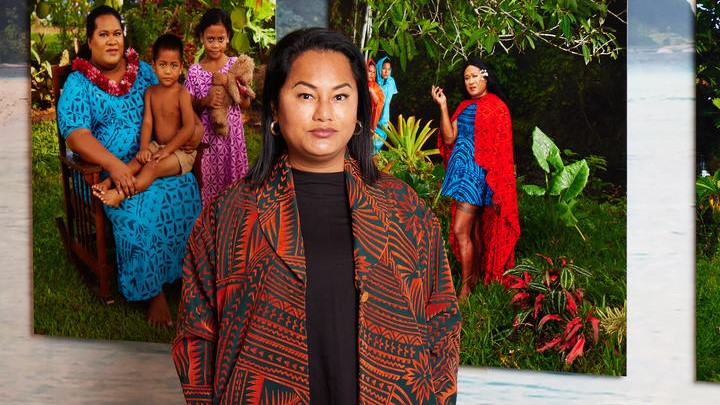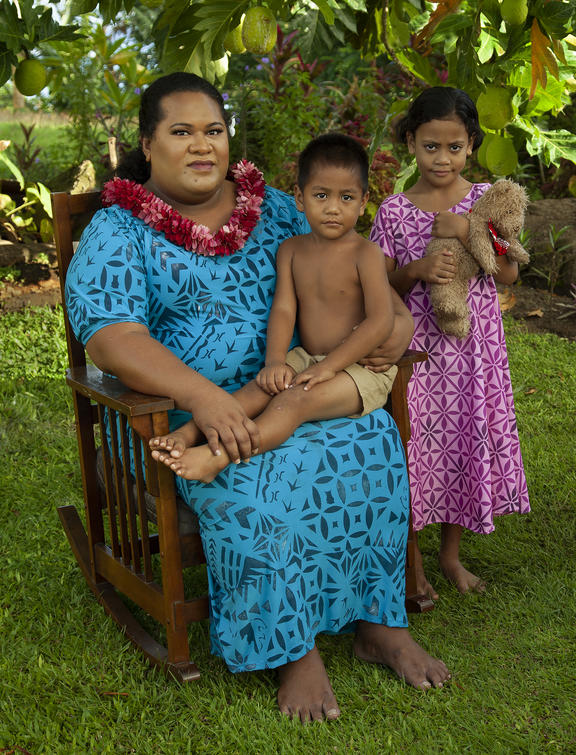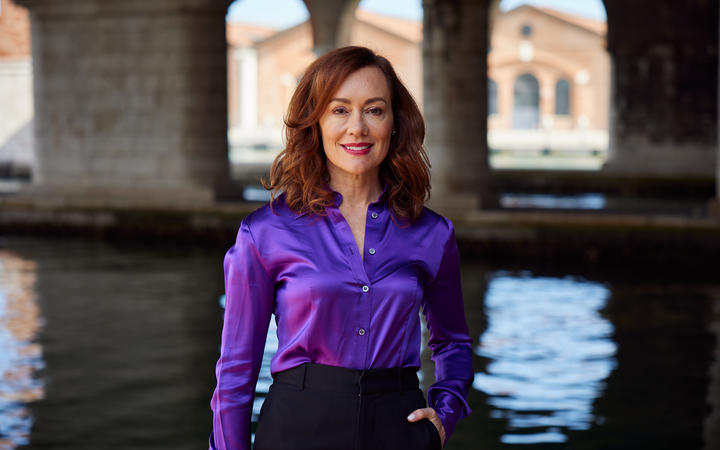‘Humbling’ response to Fa’afafine exhibition at Venice Biennale
Wednesday 4 May 2022 | Written by RNZ | Published in Pacific Islands, Regional

A native of Sāmoa, Yuki Kihara is an interdisciplinary artist of Japanese and Sāmoan descent. Photo: Creative New Zealand
Alluring images and real-life stories of Sāmoa's Fa'afafine community have been described as 'powerful' at the 59th Venice Biennale, one of the most prestigious art and cultural exhibitions in the world
Paradise Camp by Sāmoan-Japanese artist Yuki Kihara explores the idea of a 'Fa'afafine utopia', seen through a series of photographs that 'upcycles' selected paintings by Paul Gauguin.
Kihara, who is the first Pasifika and Fa'afafine artist to represent Aotearoa New Zealand at the art exhibition, said Paradise Camp is about showcasing indigenous worldviews that touch on social, historical and environmental subjects.
Fa'afafine translates to 'in the manner of a woman' and is used to describe a person who at birth is assigned as male, but expresses their gender in a feminine way.
Kihara said that underneath the facade and beautiful imagery of 'paradise', lies personal experiences of Sāmoa's fa'afafine community.
The response to Paradise Camp in Venice, particularly members of the LGBTQI+ community has been humbling for the artist.
Feeling 'validated' by exhibition
"Everybody wants to know where the Pacific is," Kihara said.
"It's so funny because I had people from all walks of life but I think in particular you know, the transgender community and the gender non-binary community you know have come up to me and say, 'You know Yuki, I've never heard of Sāmoa before but for the fact that you've brought the fa'afafine community here in your exhibition makes me feel very validated'."

Shot on several locations around Sāmoa, the models featured in each of the photographs are entirely from the country's queer community - each identifying either as fa'afafine, or fa'atama (in the manner of a man).
Widely accepted in Sāmoan society, fa'afafines contribute significantly to their families, churches and cultural obligations.
However, despite their service and reverance of Fa'a Sāmoa (the Sāmoan way), many still face discrimination and are sometimes frowned upon by their conservative peers.
The President of the Sāmoa Fa'afafine Association (SFA), Alex Su'a said being involved in the production of Paradise Camp made her reflect on life for Pacific women prior to the arrival of Christian missionaries.
"The fact that missionaries and Christianity had brainwashed our community in saying 'no, women are supposed to be reserved, you're supposed to cover yourselves up' - and we've lost that, so for fa'afafine to come in and relive that empowerment - this is probably how beautiful our women were, and beautiful in such a sense that missionaries as well as Paul Gauguin who took advantage of that by painting them."
Art exhibition a source of empowerment for all Pasifika women
Su'a said she hopes the art exhibition is a source of empowerment for all Pasifika women, no matter their orientation.

"That's the empowering factor for me, is the fact that only the fa'afafine can pull off something like reliving the natural beautiful Pasifika women that we had before the earliest time the missionaries or a European contact came in touch with our Pacific people."
Paradise Camp is shaking up art history, particularly the controversial legacy of Gauguin who produced a lot of his well-known artwork while living in Tahiti.
Curator Natalie King said since its opening, Paradise Camp has drawn in thousands of people and despite the majority of them not knowing where Sāmoa is, the art has a universal appeal.
"We're all affected by climate change, many communities are affected by discrimination but I think it's the way Yuki tells her stories that have resonated and have had, I guess, a universal appeal so her stories really uncover and kind of reverse the Western art history's traditions."

Kihara's success has encouraged other aspiring Pasifika artists.
Caren Rangi, the Chair of the Arts Council at Creative NZ, said having a Pasifika presence at Venice Biennale would hopefully shift the perception among Pasifika parents who overlook the arts and culture industry.
"If you really think about it, arts and culture plays a huge factor in the wellbeing of individuals, of families, of communities of representing the identity of people, the identity of place and so it actually makes a huge contribution to the health and wellbeing of people generally and I think that is something that people do value."
However audiences interpret Paradise Camp, Kihara said that her latest work serves as a lesson for all to be true to themselves.
"The crux of Paradise Camp is really about being honest to yourself, and living an authentic life. There are forces out there in the world that constantly try to conform you into a certain way of being and I feel that Paradise Camp offers this safe space for you just to be yourself."














































